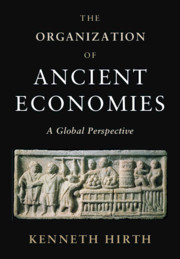Refine search
Actions for selected content:
3 results
One - The Structure of Ancient Economy
-
- Book:
- The Organization of Ancient Economies
- Published online:
- 31 August 2020
- Print publication:
- 17 September 2020, pp 1-16
-
- Chapter
- Export citation
Ten - On First Principles of the Ancient Economy
-
- Book:
- The Organization of Ancient Economies
- Published online:
- 31 August 2020
- Print publication:
- 17 September 2020, pp 317-336
-
- Chapter
- Export citation

The Organization of Ancient Economies
- A Global Perspective
-
- Published online:
- 31 August 2020
- Print publication:
- 17 September 2020
